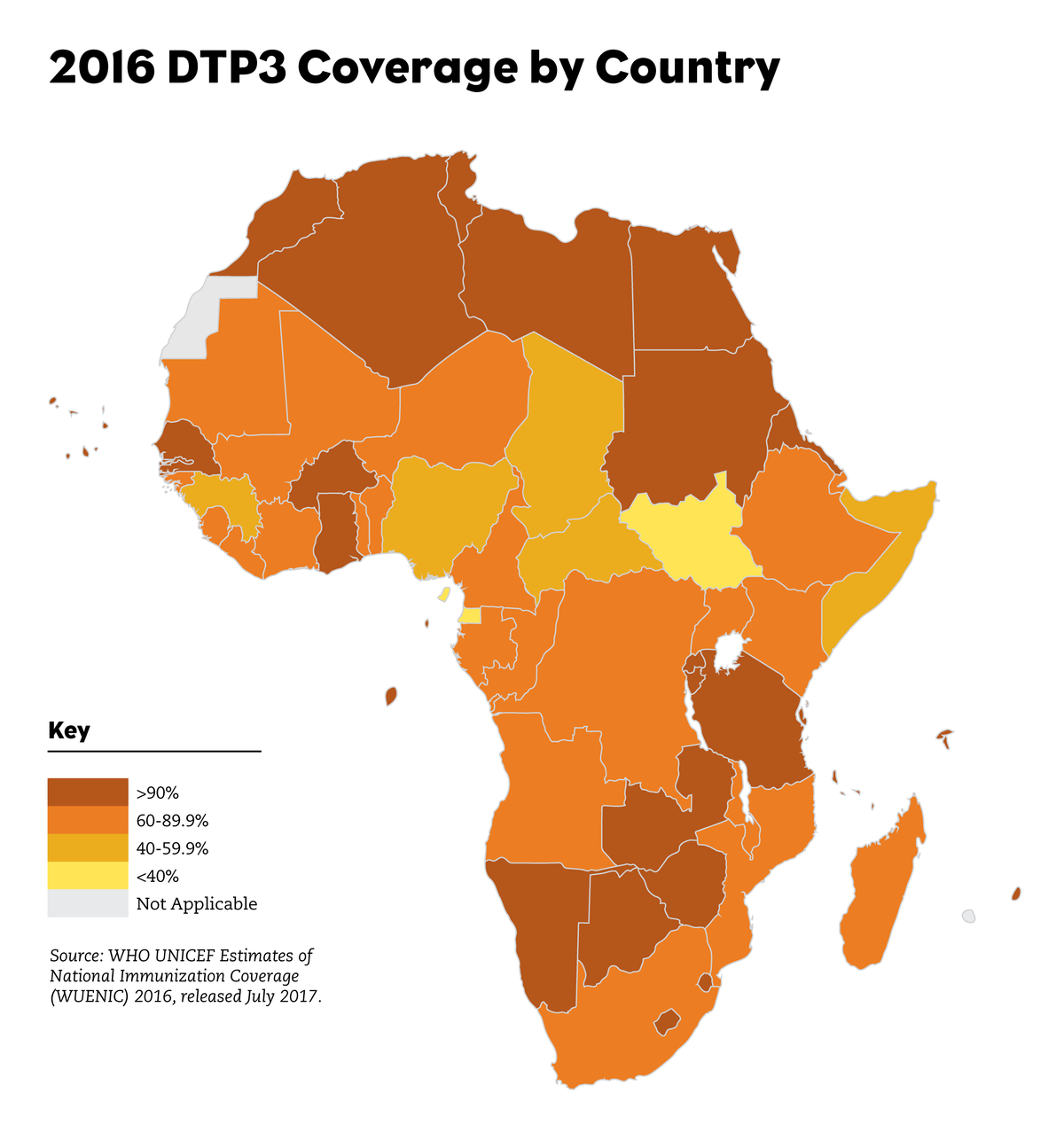Overview
Status of Immunization in Africa
Immunization saves lives, makes communities more productive and is a core component of strengthening health systems and attaining the Sustainable Development Goals. While Africa has made tremendous gains toward increasing access to immunization, one in five African children still does not have access to life-saving vaccines. As a result, vaccine-preventable diseases continue to claim too many lives.
At the 2012 World Health Assembly (WHA), all 194 Member States – including those in the African region – endorsed the Global Vaccine Action Plan (GVAP) and committed to obtaining 90% national immunization coverage by 2020. To achieve this, the African region adopted the Regional Strategic Plan for Immunization (RSPI), which sets ambitious targets, including eradicating polio and eliminating measles, rubella and maternal & neonatal tetanus by 2020. The Addis Declaration on Immunization – a historic pledge endorsed by Heads of State at the 28th African Union Summit aims to increase political will to achieve these global and regional goals.
The overall immunization coverage in a country is typically measured as the proportion of infants who have received their third dose of diphtheria, tetanus and pertussis-containing vaccine (DTP3). Full immunization data is available here.
Source: MCIA
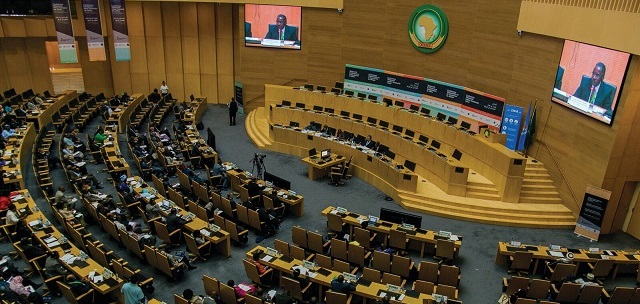
Ministerial Conference on Immunization in Africa
In February 2016, the WHO Offices in the African Region and Eastern Mediterranean Region, together with the African Union and the Government of Ethiopia, hosted the Ministerial Conference on Immunization in Africa (MCIA) in Addis Ababa, Ethiopia.
This landmark meeting convened more than 1,000 stakeholders from approximately 70 countries, including nearly every African country, to renew and strengthen commitments to improving access to lifesaving vaccines across the African continent.
Two days of in-depth panel sessions, side-events and bilateral meetings focused on: securing sustainable financing; empowering local communities; collecting better data; strengthening immunization systems; and harnessing polio’s legacy.
The Addis Declaration on Immunization
The Addis Declaration on Immunization
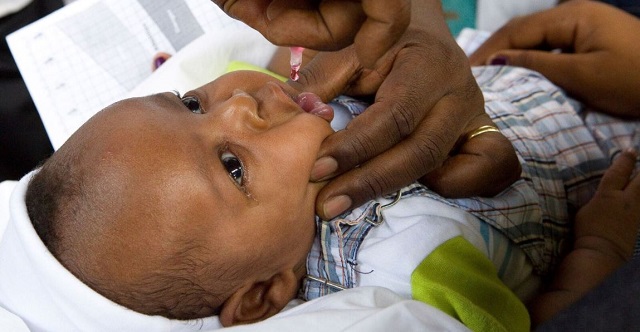
The Addis Declaration on Immunization (ADI) is a historic pledge to ensure that everyone in Africa – regardless of who they are or where they live – receives the full benefits of immunization. It includes 10 commitments to increase political, financial and technical investments in immunization programs.
On January 31, 2017, at the 28th African Union (AU) Summit, Heads of State from across Africa endorsed the ADI, thereby committing to advance universal access to immunization across Africa. The ADI was initially drafted and signed by ministers and other high-level representatives at the Ministerial Conference on Immunization in Africa (MCIA) in February 2016. Statements of support have been issued by civil society organizations, religious leaders from across faiths and parliamentarians to support countries in the implementation of the ADI.
Addis Declaration on Immunization Commitments
- Keep universal access to immunization at the forefront of efforts to reduce child mortality
- Increase and sustain domestic investments and funding allocations for immunization
- Address the persistent barriers in vaccine and healthcare delivery systems, especially in the poorest, vulnerable and most marginalized communities
- Increase the effectiveness and efficiency of immunization delivery systems as an integrated part of strong and sustainable primary health care systems
- Attain and maintain high quality surveillance for targeted vaccine preventable diseases
- Monitor progress towards achieving the goals of the global and regional immunization plans
- Ensure polio legacy transition plans are in place by end-2016
- Develop a capacitated African research sector to enhance immunization implementation and uptake
- Build broad political will for universal access to life-saving vaccines
- Promote and invest in regional capacity for the development and production of vaccines
The ADI Roadmap
The ADI Roadmap
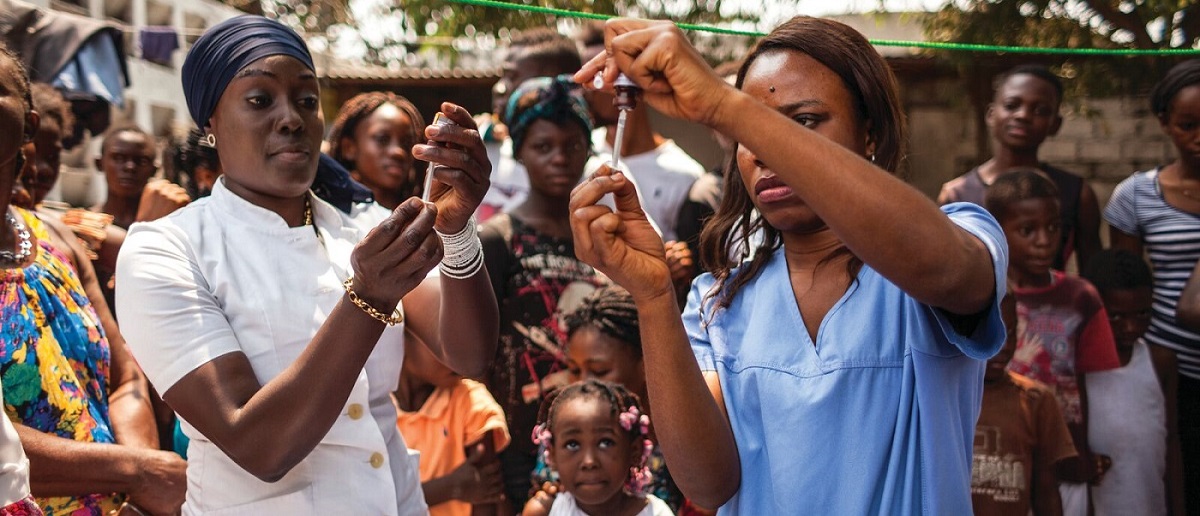
A roadmap to guide the implementation of the ADI was launched in June 2017 at the first WHO Africa Health Forum by the WHO Offices in the African Region and Eastern Mediterranean Region, the African Union Commission and immunization partners. The ADI roadmap provides Member States with three specific strategies that can be incorporated into existing efforts to improve immunization:
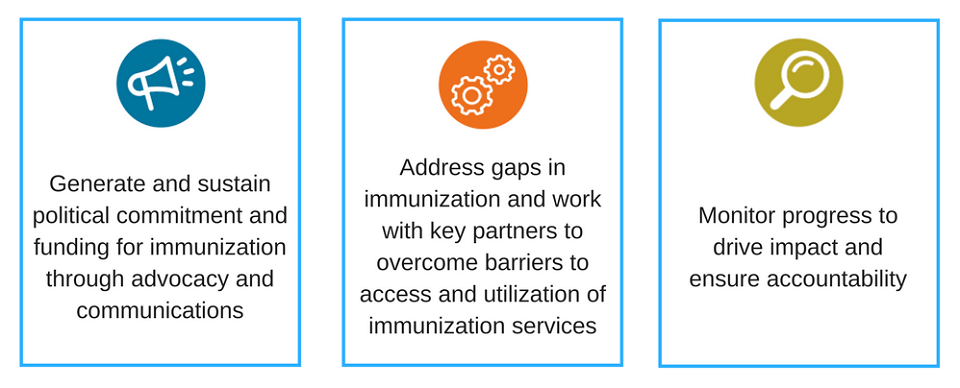
Resources
Resources
Addis Declaration on Immunization (ADI)
- Addis Declaration on Immunization: Universal Access to Immunization as a Cornerstone for Health and Development in Africa (PDF)
- Addis Declaration on Immunization Commitments (Brochure - PDF)
ADI Roadmap
- Advocacy, action, accountability: Implementing the Addis Declaration on Immunization (Brochure - PDF)
- Roadmap for Implementing the Addis Declaration on Immunization: Executive Summary (PDF)
- Roadmap for Implementing the Addis Declaration on Immunization: Advocacy, Action, and Accountability (PDF)
Ministerial Conference on Immunization (February 2016)
- Brochure (PDF)
- Fact Sheet (PDF)
- Building Better Systems: Improving Delivery of Immunisation Services in the Context of Universal Health Coverage (PDF)
- Improving Immunization Coverage and Equity (PDF)
- Ensuring Sustainability: Immunization Financing in an Era of Transition (PDF)
- Polio Legacy Transition Planning (PDF)
- Role of Communities in Coverage and Demand (PDF)
- Report - Fulfilling a promise: ensuring immunization for all in Africa (PDF)
Addis Declaration on Immunization in the news
- Despite gains in access, 1 in 5 African children go without lifesaving vaccines
-
Despite gains in access, 1 in 5 African children go without lifesaving vaccines
-
Historic Commitment from African Heads of State to Advance Immunization in Africa
A wide range of organizations are working together to support country progress toward the ADI commitments. All partners are encouraged to utilize and share the following resources. For more information about the ADI or how to get involved, please contact Helena O’Malley (omalleyh [at] who.int (omalleyh[at]who[dot]int)).



